From roads to the Internet: Planning infrastructure faster thanks to machine learning

Privacy warning
With the click on the play button an external video from www.youtube.com is loaded and started. Your data is possible transferred and stored to third party. Do not start the video if you disagree. Find more about the youtube privacy statement under the following link: https://policies.google.com/privacyWinners of the Joseph von Fraunhofer Prize from the Fraunhofer Institute for Physical Measurement Techniques IPM (f.l.t.r.): Dominik Störk, Dr. Katharina Wäschle and Prof. Alexander Reiterer.
Winners of the Joseph von Fraunhofer Prize 2019:
Prof. Dr. Alexander Reiterer, Fraunhofer IPM
Dominik Störk, Fraunhofer IPM
Dr. Katharina Wäschle, Fraunhofer IPM
An extensive network of fiber optic cables forms the basis for fast Internet, autonomous driving or parcel delivery by drone. But where are the best places for routing the cables? In order to plan cable routes, it is necessary to devise the most complete 3D model of the underlying infrastructure as possible. Until now, such planning models could not be efficiently generated in sufficient detail or with the required information density.
Professor Alexander Reiterer, Dominik Störk and Dr. Katharina Wäschle MD of the Fraunhofer Institute for Physical Measurement Techniques IPM in Freiburg have met this challenge with a new process chain based on artificial intelligence (AI). It analyzes two-dimensional and three-dimensional data fully automatically, recognizes application-specific objects and integrates this information into digital planning maps.
The tool can be used anywhere where objects and surfaces have to be captured and identified with centimeter accuracy. Deutsche Telekom is the first company to use the new automated technology, which enables it to plan fiber optic lines in Germany up to 70 times faster. More than 1800 civil engineering companies in Germany will use the data created by the Fraunhofer process chain to expand the fiber optic network.